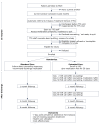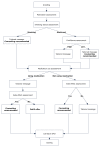Comparative effectiveness of post-discharge interventions for hospitalized smokers: study protocol for a randomized controlled trial
- PMID: 22852832
- PMCID: PMC3487923
- DOI: 10.1186/1745-6215-13-124
Comparative effectiveness of post-discharge interventions for hospitalized smokers: study protocol for a randomized controlled trial
Abstract
Background: A hospital admission offers smokers an opportunity to quit. Smoking cessation counseling provided in the hospital is effective, but only if it continues for more than one month after discharge. Providing smoking cessation medication at discharge may add benefit to counseling. A major barrier to translating this research into clinical practice is sustaining treatment during the transition to outpatient care. An evidence-based, practical, cost-effective model that facilitates the continuation of tobacco treatment after discharge is needed. This paper describes the design of a comparative effectiveness trial testing a hospital-initiated intervention against standard care.
Methods/design: A two-arm randomized controlled trial compares the effectiveness of standard post-discharge care with a multi-component smoking cessation intervention provided for three months after discharge. Current smokers admitted to Massachusetts General Hospital who receive bedside smoking cessation counseling, intend to quit after discharge and are willing to consider smoking cessation medication are eligible. Study participants are recruited following the hospital counseling visit and randomly assigned to receive Standard Care or Extended Care after hospital discharge. Standard Care includes a recommendation for a smoking cessation medication and information about community resources. Extended Care includes up to three months of free FDA-approved smoking cessation medication and five proactive computerized telephone calls that use interactive voice response technology to provide tailored motivational messages, offer additional live telephone counseling calls from a smoking cessation counselor, and facilitate medication refills. Outcomes are assessed at one, three, and six months after hospital discharge. The primary outcomes are self-reported and validated seven-day point prevalence tobacco abstinence at six months. Other outcomes include short-term and sustained smoking cessation, post-discharge utilization of smoking cessation treatment, hospital readmissions and emergency room visits, and program cost per quit.
Discussion: This study tests a disseminable smoking intervention model for hospitalized smokers. If effective and widely adopted, it could help to reduce population smoking rates and thereby reduce tobacco-related mortality, morbidity, and health care costs.
Trial registration: United States Clinical Trials Registry NCT01177176.
Figures
References
-
- Anthonisen NR, Skeans MA, Wise RA, Manfreda J, Kanner RE, Connett JE. Lung Health Study Research Group: the effects of a smoking cessation intervention on 14.5-year mortality: a randomized clinical trial. Ann Intern Med. 2005;142:233–239. - PubMed
-
- Fiore MC, Jaén CR, Baker TB, Treating Tobacco Use and Dependence: 2008 Update. Clinical Practice Guideline. MD: US: Department of Health and Human Services. Public Health Service, Rockville ; 2008.
Publication types
MeSH terms
Associated data
Grants and funding
LinkOut - more resources
Full Text Sources
Medical



